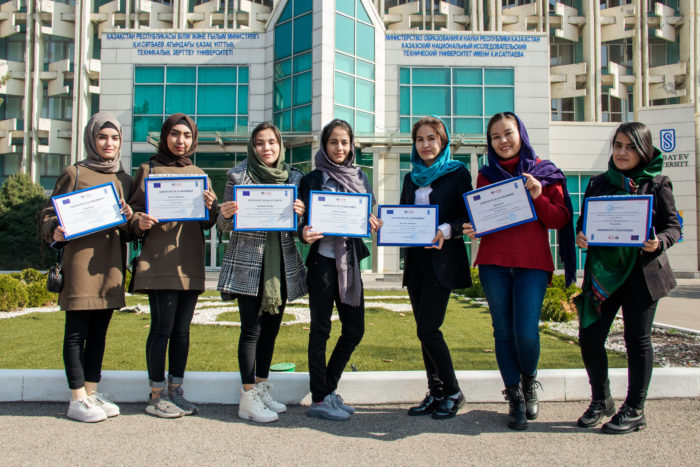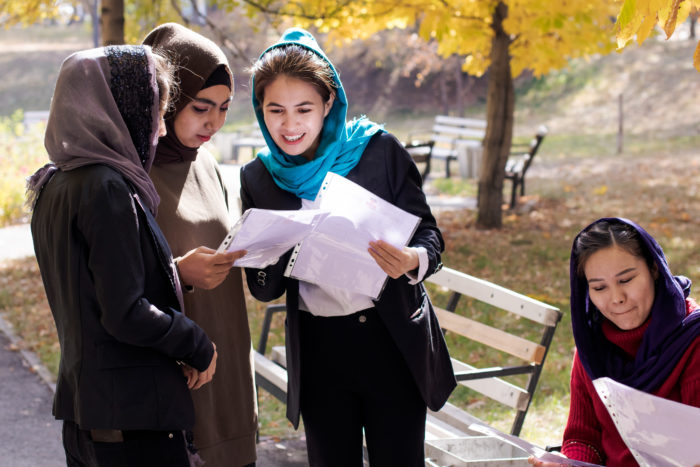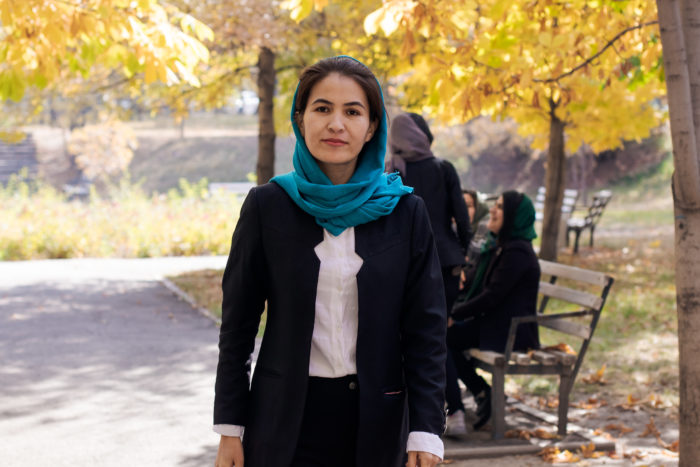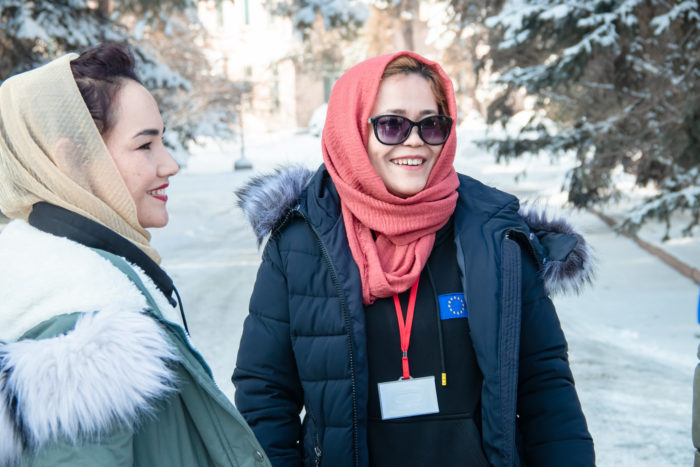NUR-SULTAN – This May, 10 recipients of the scholarships funded by the European Union (EU) from Afghanistan are graduating from AlmaU language school in Kazakhstan.

This summer, 20 students are about to become the first graduates of the program. After finishing their studies they will return to Afghanistan. Photo credit: UNDP in Kazakhstan.
After language courses, they will continue their education at the Kazakh-British Technical University (KBTU) and study technical and vocational education and training (TVET) programs in mining.
Empowerment of Afghan women
In 2019, the EU granted €2 million to support 50 Afghan women in education. The United Nations Development Programme (UNDP) has been appointed as an implementing agency of the project.

The triangular cooperation between the EU, Kazakhstan/Uzbekistan and Afghanistan strives to contribute to building a sustained regional cooperation and the peace-building process and economic development of Afghanistan and wider Central Asian region overall. Photo credit: UNDP in Kazakhstan.
Ten of them are studying in Uzbekistan and 40 in Kazakhstan. They are studying under the MA, BA and TVET programs. This summer, 20 students are about to become the first graduates of the program. After finishing their studies they will return to Afghanistan.
Empowering women through removing existing barriers and inequalities is the main goal of the initiative. “By empowering women through providing education, the programme greatly contributes to gender equality in the country and the region. Facilitating connectivity, trade and economic cooperation is another crucial contribution of the project,” reports the UNDP office in Kazakhstan.

Muzhgan Hussaini
The extra-curricular activities for the students are also included in the program. This year, the United Nations Women in Kazakhstan in cooperation with the Center for Gender Economics Research (GERC) at Narxoz University organized the ‘Winter School’ in Almaty and Tashkent.
The workshops aim to improve leadership skills and increase awareness on gender equality, the expansion of social and economic rights and opportunities for women, social inclusion, peace, security, and provide tools for personal and professional development for women.
Students and their studies
The Astana Times spoke with students who are graduating this year, about their experience of student life in Kazakhstan.

Fatima Mohammadi
Muzhgan Hussaini, 27, is studying the Master’s program in mining engineering at the Almaty-based Satbayev University. She believes that mining is one of the major sectors for rebuilding the economy.
Despite the pandemic related challenges, Hussaini appreciates the efforts taken by the UNDP team, AlmaU university staff and Satbayev University in finding alternative approaches to some practical classes.
Hussaini has plans to find a job after graduation in her hometown. “I have to support my family. I would like to work for the Ministry of Mining or UN agencies. In the long term, I would work to build my own business. This is my plan but how the life trajectory goes depends on other factors as well. I hope for the best!” she said.
After living two years in Kazakhstan, Hussaini promised to leave a piece of her heart here. “I love both Kazakhstan and the Kazakh people. Kazakhstan is a peaceful country with people who have golden hearts,” she added.
Fatima Mohammadi decided to study finance at the KBTU due to her previous work experience in finance and statistics. “I am very enthusiastic about this field,” she said.
Mohammadi admitted that the pandemic taught them to adapt and manage their student life in new conditions.
“My eyes are suffering from the constant use of electronic devices. So I have to do some exercises for my eyes. By making a useful schedule we stayed in Kazakhstan during the pandemic and have passed memorable time here using different apps and online methods in effective learning,” she added.
Mohammadi enjoyed her studies as well, especially experiencing the new culture and meeting interesting people.
“Kazakhstan is a beautiful country with nice and humid weather. People here are kind and work hard. What impressed me is women’s participation in any aspect of society. They worked hard no matter what position they are in and they are proud to serve their country,” she said.
Mohammadi hopes to find a job as a teacher in her country. She also has some ideas on how to help local farmers by providing refrigeration machines to store fruit and vegetables in different seasons. This will raise the local GDP and boost imports in the country.
Women represent almost half of Afghanistan’s population. According to the Afghanistan Living Conditions Survey (2016-2017), 80 percent of men and only 20 percent of women represent the active economic population. Now the government is taking measures to turn women into active economic agents.
The number of women applying to universities each year has grown significantly from 1,746 in 2002 to more than 45,000 in 2016. In 2017-2018 only 20 percent of all university students in Afghanistan are women, although they constitute half the population of 38.9 million, according to the UN statistics.
Only 5 percent of Afghan women received tertiary education in 2018, according to UNESCO. Over 9 million children are studying at school, some 39 percent of them are girls.
